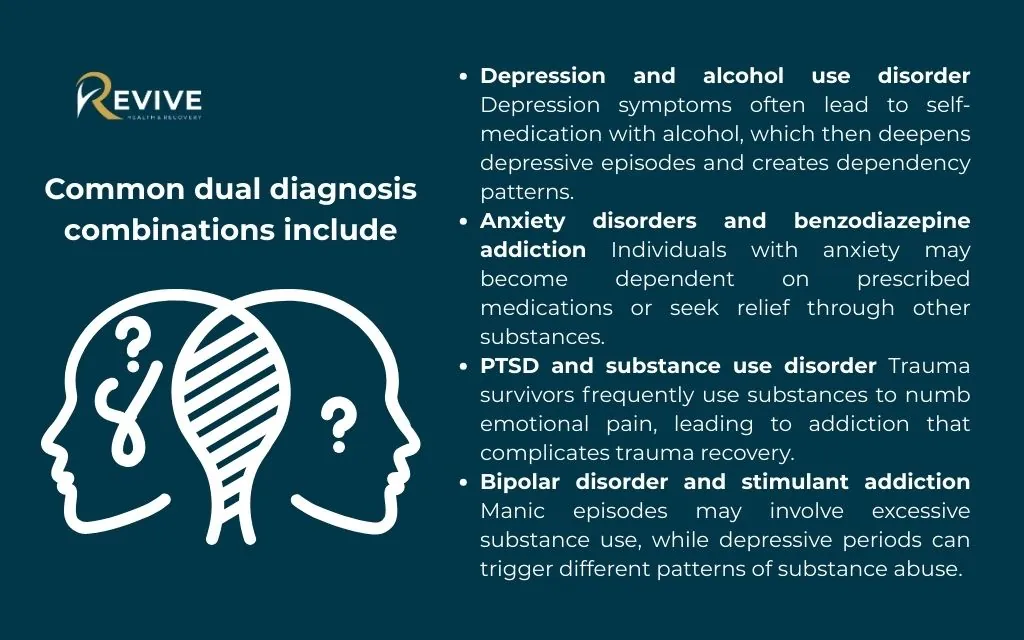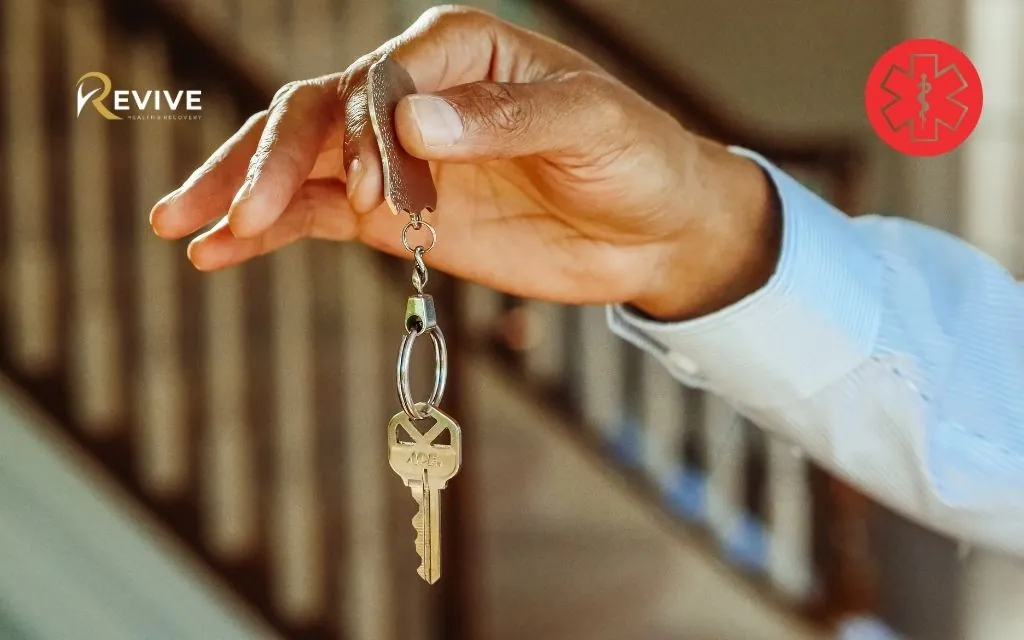Overcoming addiction becomes more complex when mental health conditions exist alongside substance use disorders. This dual diagnosis reality affects thousands of Denver residents who struggle with both addiction and mental health challenges simultaneously. In Colorado, where 12% of adults experience substance use disorders compared to the national average of 8%, understanding the interconnected nature of these conditions is crucial for successful recovery.
At Revive Health Recovery, we recognize that overcoming addiction requires treating the whole person, not just the substance use. Our integrated approach addresses both mental health and addiction concerns together, providing the comprehensive care needed for lasting recovery in the heart of Denver.
Recognizing the cycle of addiction and mental health
The dual diagnosis connection
Co-occurring disorders create a complex cycle where mental health symptoms can trigger substance use, while addiction worsens mental health conditions. Research shows that individuals with mental health disorders are twice as likely to develop substance use disorders, and vice versa.
Common dual diagnosis combinations include:
- Depression and alcohol use disorder Depression symptoms often lead to self-medication with alcohol, which then deepens depressive episodes and creates dependency patterns.
- Anxiety disorders and benzodiazepine addiction Individuals with anxiety may become dependent on prescribed medications or seek relief through other substances.
- PTSD and substance use disorder Trauma survivors frequently use substances to numb emotional pain, leading to addiction that complicates trauma recovery.
- Bipolar disorder and stimulant addiction Manic episodes may involve excessive substance use, while depressive periods can trigger different patterns of substance abuse.
Breaking the cycle of addiction and mental health
Overcoming addiction in dual diagnosis situations requires simultaneous treatment of both conditions. When only one condition receives treatment, the untreated disorder often triggers relapse in the other. This is why integrated treatment approaches show significantly higher success rates than treating conditions separately.
Colorado-specific data reveals that 42% of treatment admissions involve methamphetamine or heroin use, with many cases involving co-occurring mental health conditions. Over 95,000 Coloradans aged 18 and older report not receiving needed substance use treatment, highlighting the critical need for accessible dual diagnosis care.

Key strategies for overcoming addiction
Evidence-based therapeutic approaches
- Cognitive Behavioral Therapy (CBT) CBT helps identify and change thought patterns that contribute to both addiction and mental health symptoms. This approach teaches practical coping strategies for managing triggers and developing healthier responses to stress.
- Dialectical Behavior Therapy (DBT) Originally developed for borderline personality disorder, DBT proves highly effective for addiction treatment. It focuses on four key skills: mindfulness, distress tolerance, emotion regulation, and interpersonal effectiveness.
- Motivational Interviewing This collaborative approach helps individuals find their own motivation for change. Rather than confronting resistance, motivational interviewing guides people to discover their personal reasons for overcoming addiction.
- Trauma-Focused Cognitive Behavioral Therapy (TF-CBT) For individuals with trauma histories, TF-CBT addresses both trauma symptoms and substance use patterns. This specialized approach is crucial for those whose addiction stems from attempts to cope with traumatic experiences.
Building support systems
- Family involvement Family therapy plays a crucial role in addiction recovery. Family members learn how to support recovery while maintaining healthy boundaries. Education about addiction as a medical condition helps reduce stigma and improve family dynamics.
- Peer support groups Recovery groups near me provide connection with others who understand the challenges of overcoming addiction. Groups like AA, NA, and SMART Recovery offer different approaches to peer support and accountability.
- Professional treatment teams Integrated treatment requires coordination between addiction counselors, psychiatrists, therapists, and medical professionals. This team approach ensures all aspects of dual diagnosis receive appropriate attention.

Medication-assisted treatment
For certain substance use disorders, medication can play a vital role in recovery. Medications like naltrexone for alcohol use disorder or buprenorphine for opioid addiction help manage withdrawal symptoms and reduce cravings while individuals engage in therapy and build coping skills.
Mental health medications may also be necessary to stabilize mood or anxiety symptoms, making it easier to engage in addiction treatment. The key is careful coordination between prescribing physicians to avoid interactions and ensure optimal treatment outcomes.
Revive Health Recovery’s local programs for overcoming addiction
Our specialized dual diagnosis approach
At Revive Health Recovery, located at 1427 S Federal Blvd in Denver, we offer comprehensive outpatient addiction therapy Denver residents trust. Our programs are specifically designed to address the unique challenges of dual diagnosis recovery.

Intensive Outpatient Program (IOP)
Our IOP provides structured treatment while allowing you to maintain work, school, and family responsibilities. Sessions include group therapy, individual counseling, and family therapy components.
Individual therapy sessions
One-on-one sessions with licensed addiction counselors address your specific dual diagnosis needs. We use evidence-based approaches tailored to your unique situation and treatment goals.
Group therapy programs
Peer support through group sessions helps you connect with others facing similar challenges. Our groups focus on specific topics like trauma recovery, anxiety management, and relapse prevention.
Family therapy services
Recovery affects the entire family system. Our family therapy programs help rebuild trust, improve communication, and create supportive home environments for lasting recovery.
Culturally competent care
Denver’s diverse community requires treatment that respects different cultural backgrounds and languages. Our team understands how cultural factors influence both mental health and addiction experiences. We provide services that honor your cultural identity while supporting your recovery journey.
Flexible scheduling
Our outpatient programs work around your schedule. We offer evening and weekend sessions to accommodate working professionals and parents who need flexible treatment options.
Creating your personalized recovery plan
Assessment and goal setting
Recovery begins with a thorough assessment of both your addiction and mental health symptoms. This comprehensive evaluation helps determine the appropriate level of care and treatment approaches most likely to support your success in overcoming addiction.
Clinical assessment Licensed professionals evaluate the severity of both substance use and mental health symptoms. This assessment considers factors like:
- Duration and intensity of substance use
- Mental health symptom severity
- Previous treatment experiences
- Support system strength
- Medical considerations
Goal development Together, we establish realistic, measurable goals for your recovery. These might include maintaining sobriety, managing depression symptoms, rebuilding relationships, or returning to work or school.
Treatment planning
Your personalized treatment plan integrates evidence-based approaches for both addiction and mental health recovery. The plan evolves as you progress, with regular adjustments to ensure continued effectiveness.
- Treatment modalities Your plan may include various therapeutic approaches based on your specific needs and preferences. We combine individual therapy, group sessions, family work, and medication management as appropriate.
- Recovery milestones We establish clear milestones to track progress and celebrate achievements. These checkpoints help maintain motivation and allow for plan adjustments when needed.
Relapse prevention strategies
Overcoming addiction is an ongoing process that requires preparation for potential setbacks. Our relapse prevention planning includes:
- Trigger identification Learning to recognize situations, emotions, or thoughts that increase relapse risk helps you prepare effective responses.
- Coping skill development Building a toolkit of healthy coping strategies provides alternatives to substance use during difficult times.
- Support system activation Knowing when and how to reach out for help is crucial for maintaining recovery during challenging periods.
FAQs about overcoming addiction
What are the most effective treatments for overcoming addiction with dual diagnosis in Colorado?
Integrated treatment addressing both conditions simultaneously shows the highest success rates. At Revive Health Recovery, we combine evidence-based therapies like CBT and DBT with medication management and peer support for comprehensive dual diagnosis care.
How long does it take to overcome addiction when mental health issues are involved?
Recovery timelines vary based on individual factors, but dual diagnosis treatment typically requires longer engagement than single-condition treatment. Most people see significant progress within 90 days of consistent treatment, with continued growth throughout the first year and beyond.
Can I overcome addiction through outpatient treatment alone?
Many people successfully recover through outpatient programs, especially when they have stable housing and support systems. Revive Health Recovery’s intensive outpatient programs provide comprehensive care while allowing you to maintain daily responsibilities.
How do I know if I need specialized dual diagnosis treatment?
If you experience both substance use problems and mental health symptoms like depression, anxiety, or trauma responses, dual diagnosis treatment is likely beneficial. Our assessment team can evaluate your needs and recommend appropriate care levels.
What insurance options cover dual diagnosis treatment in Colorado?
Most major insurance plans cover substance abuse counseling Denver services and mental health treatment. Contact Revive Health Recovery at (303) 268-4655 to verify your benefits and discuss payment options, including sliding scale fees for those who qualify.
Take the first step toward recovery today
Overcoming addiction while managing co-occurring mental health conditions requires specialized care and support. You do not have to face this challenge alone. At Revive Health Recovery, our experienced team understands the complex relationship between addiction and mental health, and we are here to guide you through every step of your recovery journey.
Our Denver location at 1427 S Federal Blvd provides easy access to comprehensive dual diagnosis treatment. We offer flexible scheduling, insurance verification, and immediate support for those ready to begin their path to recovery.
Contact Revive Health Recovery today:
- Phone: (303) 268-4655 (Available 24/7)
- Email: contact@revivehealthrecovery.com
- Address: 1427 S Federal Blvd, Denver, CO 80219
Your recovery journey begins with a single phone call. Reach out today to learn more about our specialized programs for overcoming addiction and co-occurring mental health conditions. Let us help you build the foundation for lasting recovery and renewed hope.



